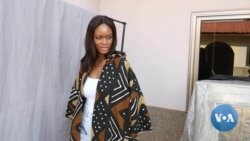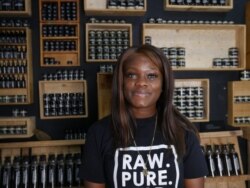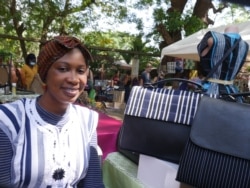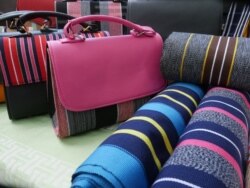Northern Ghana is underdeveloped, and women have borne the brunt of it, with high levels of poverty and few economic opportunities. Businesswomen in the capital are trying to help by working with northerners to make unique products to sell locally and to international markets.
In Accra, some women-owned businesses are working with non-profits and women about 700 kilometers north, sourcing raw materials for their goods, such as shea butter.
The butter, extracted from the nut of the African shea tree, is a staple in Violet Amoabeng’s line of natural beauty products.
She says one of the goals of her business, Skin Gourmet, is to help women keep the next generation out of poverty through economic empowerment.
“We ensure that they are able to use the profits or the money they get from our purchases to improve their livelihoods by doing things like building clinics, taking the children to school or ensuring that they have a job,” she said.
Mobarika Awudu supports women in the north by buying handmade fabrics from local women to make bags for markets in Accra. Her father came from a northern village so she is aware of the hardships in the region.
She says women’s economic independence has become especially important this year as incomes were stretched from COVID-19.
“Some of them are doing well, they have started with weaving alone, now they have apprentices that they are training as well, especially now that the schools are in lockdown lots of the girls are now learning how to make a livelihood from weaving," she said.
Threaded Tribes puts a modern twist on traditional fashion to encourage young people to appreciate African fabrics. Awurama Mankatah sources her fabrics from across Africa, including from women weavers in Ghana’s north.
“The fact that they are women makes me happy," she said. "There are barely any men weavers, to be honest, because they are on the farms, even the women being on the farms, too, but the weaving is the women’s’ business. Being a woman - and a black woman at that - it’s amazing, it’s so amazing to be able to do this with women, to be honest, it’s great.”
While the north produces quality materials enjoyed across the world, there are few economic opportunities there, forcing young people to move south, many to already crowded cities.
Much more needs to be done to help young women build their futures in the north, including investments and improved education, business and livelihood conditions, entrepreneurship expert Sheena Lovia Boateng says.
“In terms of development, when you look at all the different regions in Ghana some of the most deprived can be found in the north, so it’s only fair that given that they’re giving us so much of value at least we give back a bit to ensure that the community also thrives," she said.
More investments and commitment to sustainable business practices would come with improved economic development in the north, leading to better outcomes for all, she said.









